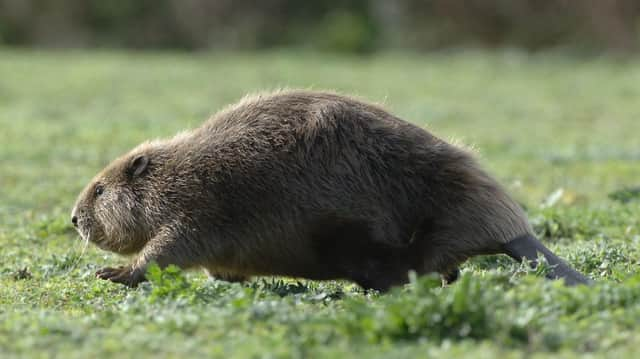Scotland’s beavers are a protected species. So why has a fifth of the population been killed in a year? – Steve Micklewright


Last year the First Minister directly acknowledged the crisis facing our wildlife. In the 2019 Programme for Government, she stated: “Biodiversity loss and the climate emergency are intimately bound together: nature plays a key role in defining and regulating our climate and climate is key in shaping the state of nature."
One animal that demonstrates how nature can help us tackle the climate emergency is the beaver.
Advertisement
Hide AdAdvertisement
Hide AdBeavers build dams that slow water flows, preventing flooding downstream – limiting one of the most obvious impacts of climate change. The ponds that their dams create also have knock-on benefits for other wildlife – providing richer conditions and more food for all freshwater creatures, including the economically significant species of fish prized by anglers.
This is one of the reasons beavers are called ‘ecosystem engineers’ and a ‘keystone species’, and why the multiple benefits this native species brings to nature, climate and the economy are championed by the growing rewilding movement in Scotland.
Beavers, then, are a good thing. So it is perhaps surprising to learn that the Scottish Government authorised the killing of no less than 20 per cent of Scotland’s beaver population last year, immediately after the same Government gave them protected species status on 1 May, 2019. You could be forgiven for thinking that something does not add up – and you would be right.
Farmers currently have only one solution
The reason 87 beavers have been killed is because farmers in low-lying parts of Tayside are experiencing, firsthand, how this special animal can change the landscape. Unfortunately for these farmers, this is at the expense of their agricultural land.
At the Scottish Rewilding Alliance, a coalition of leading environmental charities, we advocate paying farmers for having beavers on their land so they can financially benefit from their presence – but right now the only solution for Tayside farmers is to apply for a licence to kill beavers.
Meanwhile, in other parts of Scotland, we know of many landowners and communities who would welcome the return of beavers. But this positive solution has been blocked by the Scottish Government, which has said beavers will only be allowed to spread naturally and cannot be relocated within Scotland to new areas to establish new populations. Ironically, this has not stopped some beavers from being captured in Tayside and released in England.
The relevant minister, Roseanna Cunningham, seems locked into a mindset that is preventing the assisted spread of beavers in Scotland through official relocations, while at the same time facilitating their possible extinction by allowing a deeply concerning one-in-five animals from the current, already fragile, population to be killed.
Relocation of beavers a win-win
Fortunately, MSPs have a chance to intervene if they vote in favour of an amendment to the Animals and Wildlife (Penalties, Protections and Powers) (Scotland) Bill on Wednesday this week.
Advertisement
Hide AdAdvertisement
Hide AdAn amendment proposed by Mark Ruskell MSP would not allow the licensed killing of beavers unless the Government is sure the species has reached a favourable conservation status in Scotland – something that is currently unknown.
If this amendment passes, something will have to be done to deal with any beavers that are causing problems. The worst-case scenario is if farmers feel they have no alternative but to take matters into their own hands and illegally kill beavers without a licence.
But there could be a win-win solution here if the minister simply allowed beavers to be humanely captured and carefully moved to those parts of Scotland with suitable habitat that it would otherwise take them many decades to reach through natural colonisation.
I think she would be surprised by the number of people who would welcome them to their area – and the Scottish Government could use this as an example of leadership in both biodiversity recovery and climate change.
Ultimately, each beaver shot under the current licensing scheme is a wasted life that could have helped tackle the climate emergency and nature crisis by creating a thriving nature-rich wetland somewhere else in Scotland.
Without a change of approach, the return of beavers to Scotland could be short-lived, in stark contrast to the growth in their populations across Europe, where more positive attitudes to wildlife and rewilding are already more widespread.
The fate of Scotland’s beavers really is in the hands of our elected politicians. Let’s hope they make the right decision on Wednesday.
A message from the Editor:
Thank you for reading this article on our website. While I have your attention, I also have an important request to make of you.
Advertisement
Hide AdAdvertisement
Hide AdWith the coronavirus lockdown having a major impact on many of our advertisers - and consequently the revenue we receive - we are more reliant than ever on you taking out a digital subscription.
Subscribe to scotsman.com and enjoy unlimited access to Scottish news and information online and on our app. With a digital subscription, you can read more than 5 articles, see fewer ads, enjoy faster load times, and get access to exclusive newsletters and content. Visit www.scotsman.com/subscriptions now to sign up.
Our journalism costs money and we rely on advertising, print and digital revenues to help to support them. By supporting us, we are able to support you in providing trusted, fact-checked content for this website.
Joy Yates
Editorial Director
Comments
Want to join the conversation? Please or to comment on this article.